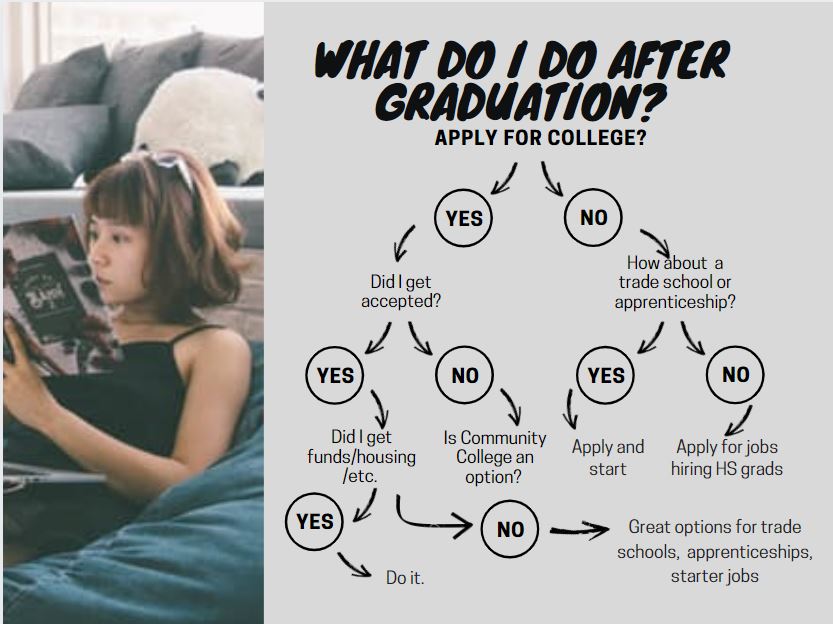Category: College
4 Tips on Getting into Princeton
Getting into your dream university–especially if it’s Ivy League–is not an easy task. One of our Ask a Tech Teacher contributors has four suggestions to make it easier:
How Hard is it to Get into #Princeton University?
Located in Princeton, New Jersey, Princeton is a member of the prestigious Ivy League. It is famous for its academic excellence and distinguished faculty. The university is one of the top universities in the United States. Thus, admission is sought after by students from around the world. If you are considering applying to Princeton, it is important to understand the admissions process and what the university is looking for. (more…)
Share this:
High School Curricula and Career Education
College enrollment among high school grads grew during the early 2010’s, leveling off about 2017 when it began to drop to a current low of about 62%, approx. 4% lower than 2019. The decline may be due to increased costs, that the cost-benefit of a college degree and earnings after graduation is questionable (according to some studies), the pandemic, or a plethora of other reasons. The current trend among some colleges of not requiring ACT or SAT scores hasn’t stopped the fall.
One of the Ask a Tech Teacher contributors has come up with a good article on how to make career information more easily available to high school graduates, with a focus on those who may not want to continue to a college or University. This article reviews the many benefits of providing career education for high school students and which areas are particularly valuable. It looks at how to best include this learning into an existing curriculum.
How High School teachers can incorporate careers education into the curriculum
Including career education in the curriculum is important for a number of reasons. It will help students to better understand what they want to do when they grow up, and it will also give them a better idea of the different options that are available to them. Teaching high school students about careers also helps them to develop skills that will be useful in their future jobs, such as problem-solving and teamwork. In addition, it can also help to inspire them to pursue their dreams and goals.
Helping students understand their own strengths and weaknesses, and how these match up with different careers
It’s never too early to start thinking about career options. But for many students, the thought of choosing a single path can be daunting. One way to ease the pressure is to help students understand their own strengths and weaknesses, and how these match up with different careers. You can include this in the curriculum by helping students assess their skills and interests, students can then begin to narrow down their options and find a career that is a good fit. In addition, understanding their strengths and weaknesses can help students identify areas that need improvement. With this knowledge in hand, they can then take steps to address any deficiencies and become better prepared for their chosen career. Ultimately, by helping students understand themselves, we can give them the tools they need to make informed decisions about their future.
Share this:
Amazing Benefits of Taking a Short Course
Too often, we think ‘taking a class’ requires a commitment of weeks–or months–to master the topic. Sometimes, you don’t have that much time, they’re too expensive, you aren’t ready to commit to college level courses, or you aren’t sure about investing so much time in a topic you might not enjoy. Thankfully, in today’s learning environment, lots of learning is available via short courses–dedicated classes that are completed quickly. Here’s a great article by the Ask a Tech Teacher crew discussing :
- why take one
- their flexibility
- where to take them
- what to do if you’re ready to get started (especially for those of you who live in Australia)
Amazing Benefits of Taking a Short Course
A short course means learning both academic and physical skills. It gives opportunities to students to learn more about their specific course in a short period. The purpose of short courses is to help students grow their current set of skills. It teaches the basic skills needed for students to become a professional.
Boost Current Skill
Short courses are a great thing to add to each person’s CV, but there is more reason why taking short courses has great benefits. A short course helps students to reach the other set of skills that they need. It also gives little commitment to refresh the things students might need to work on.
AU short courses give professional recognition and a certificate that can add to each person’s CV. It also has many providers that allow students to find courses they need to enhance easily.
Flexibility
People may worry that short courses may take too much of their time,
or maybe it is not worth it. But here is some things that you need to know about the short course:
- All study materials are delivered online
- Students can study anywhere and anytime they want
- Students manage their time studying
A short course is very flexible because it is an online school where every student manages their time of study. It also gives certificates of completion which can add to each person’s portfolio.
Share this:
How to Showcase Your Skills when Applying for Your First Job
This article is for recent graduates, either from high school or college, ready to look for a first job. Here are some great tips on preparing your resume and spotlighting skills that will make you interesting to employers:
You’ve been in school for the longest time, but you are now done with college, and it’s time to look for a new job. Unfortunately, with so many candidates in search of the same job as you, you’re so anxious, wondering if you will ever get a working opportunity. Again, when looking for a new job, you are very likely to encounter job descriptions that you fear might not have the needed requirements. But the good thing is that employers might consider some skills over others.
If we are being completely honest with ourselves, your skills and potential can land you the job you want, rather than your specific background or the degree you’re holding. Employers these days are valuing soft skills. They are also willing to invest in developing their employees’ technical or hard skills after hiring them.
This is why you need to know how to showcase your skills when applying for a new job. This will help you be considered over other candidates in the same boat as you are and get offered a chance to work.
Consider going through the following points on how to showcase your skills when you are applying for a first-time job:
Share this:
Assistive Technology in Colleges
With technology, it is so much easier to offer students the assistive technology they need to pursue their education dreams. The Tech Edvocate has so great suggestions for apps and prograsms to help those with specialized needs:
What to Ask Colleges About Assistive Technology – The Tech Edvocate
10 More Educational Technology Concepts Every Teacher Should Know About
The selection process for colleges involves several factors for graduating high school students. Problems regarding tuition, academic programs, and location are often considered when students decide which college they will attend.
More about special needs from Ask a Tech Teacher
Share this:
Preparing for College or Career
Preparing students for college or career is arguably the biggest goal for High School. I like the focus of this particular principal, spotlighted in an article in The 74 Million:
Principal’s View: To Prepare Students to Enter a Tech-Focused Business World, Create Schools With the Workplace in Mind
Consider the world students face when they graduate. For many, their choices lead to college, vocational training or manufacturing careers that rely heavily on advanced technologies — from robotics and 3-D printing to equipment powered by artificial intelligence. Two decades from now, their jobs will be even more tech-focused, as workplaces adopt innovations we’ve yet to even imagine.
Check out these Ask a Tech Teacher articles and resources on College and Career:
Share this:
College or Career? The answer isn’t what you’d expect for males
I read an interesting article in the Wall Street Journal discussing the dramatic decline in men applying for and graduating from two and four-year colleges. Here’s the introductory piece of the discussion:
Men are abandoning higher education in such numbers that they now trail female college students by record levels.
At the close of the 2020-21 academic year, women made up 59.5% of college students, an all-time high, and men 40.5%, according to enrollment data from the National Student Clearinghouse, a nonprofit research group. U.S. colleges and universities had 1.5 million fewer students compared with five years ago, and men accounted for 71% of the decline.
This education gap, which holds at both two- and four-year colleges, has been slowly widening for 40 years. The divergence increases at graduation: After six years of college, 65% of women in the U.S. who started a four-year university in 2012 received diplomas by 2018 compared with 59% of men during the same period, according to the U.S. Department of Education.
While the reasons for the decline are varied and complicated, the solutions mind-numbing, if your high school students are looking for alternatives to traditional four-year college and University environment, run through this simple matrix to see which you’re better suited for:
Then, check out these articles discussing how to prepare for the choice best for you:
College or Career? Check out These
MS Career Planning: Moving in the Right Direction
Clutch Prep: When You Need Help With a Class
What to do when Johnny wants career, not college?
Whether you pick college or career, students need to prepare a resume. Here are resources to create one that’s professional and thorough:
- Google Docs–go to Docs.Google.com and select Resume template
- PorfolioGen–A free site that lets you collect all the pieces of your experience into one nicely-formatted digital place.
- Resume Builder
- Resume Generator
- Student CV Builder
- Wix–This is free with lots of templates so you can share exactly the right image. Here are examples.
- WordPress–Use a free WordPress blog, but instead convert the pages to topics discussed below. Here’s an example.
Share this:
What to Know Before Moving From High School Teacher to College Professor
A logical step for many teachers is to progress from teaching High School to College. But that is more complicated than it sounds. Here’s an good article from an Ask a Tech Teacher contributor on what you should know to make that a successful endeavor:
What to Know Before Moving From High School Teacher to College Professor
 Teaching is one of the most fulfilling, albeit challenging, jobs you can do. No matter the location or level, there will be immense feelings of pride, moments of anguish and many tired nights and weekends.
Teaching is one of the most fulfilling, albeit challenging, jobs you can do. No matter the location or level, there will be immense feelings of pride, moments of anguish and many tired nights and weekends.
For those who get started as a high school teacher, there comes a time when they think about moving on to teaching at the college level. If you have interest in becoming a college professor, the following questions will help you understand all the benefits, differences, challenges and steps to changing your career path.
High School or College: Which Has a Higher Earning Potential?
As most educators know, there is a salary bump at the college level. The median pay for post-secondary (college) teachers in 2020 was $80,790, according to the Bureau of Labor Statistics (BLS). This is well above the $62,870 median annual salary for high school teachers. In general, education isn’t the field you enter to get rich, but that extra income can be a major incentive to make the transition.
Are There Fewer Jobs Available for College Professors?
Though it may be surprising, there are actually more college professors in the United States than high school teachers. In 2020, there were 1.33 million post-secondary teachers compared to less than 1.05 million high school teachers, according to BLS. The field is also expanding faster in higher education, which BLS forecasts will add another 121,500 workers by 2029, compared to just 40,200 more in high school.
What Are the Requirements to Teach in College?
While the majority of tenure positions at four-year universities will require a doctoral degree — plus at least seven years teaching in the field for an institution — there are a range of opportunities available with a master’s degree as well. Community college teachers, for example, typically only ask for a master’s, and even well-known schools hire professors in some specialities, including the arts, without a Ph.D.
Share this:
Inspire Kids to Pursue an IT Degree
This is such an important topic! Often kids–and parents–see tech as complicated, daunting, all-math-and-science. Kids think they’re not ‘smart’ enough and maybe, parents think that too! Here are great suggestions for encouraging young participation in a field that is probably the top choice for jobs:
4 Ways to Inspire Kids to Pursue a Degree In Information Technology
 In this tech-centric day and age, the demand for science, technology, math, and engineering skills has spiked significantly, and it only seems to increase. This is evident in how an increasing number of schools offer information technology degrees. There isn’t a single day that we don’t interact with technology. However, while the vast majority of people understand how to use technology, far too few want to understand how technology works.
In this tech-centric day and age, the demand for science, technology, math, and engineering skills has spiked significantly, and it only seems to increase. This is evident in how an increasing number of schools offer information technology degrees. There isn’t a single day that we don’t interact with technology. However, while the vast majority of people understand how to use technology, far too few want to understand how technology works.
It’s intimidating to delve into the finer details on the functionality of tech. Most people know how to use a social media platform, but show no interest in understanding the coding behind it. How then, can we spark such an interest in our children?
Start With Toys
Playtime eventually evolves into work time, and toys have a powerful influence on a child’s interests, thinking, behavior, and creative expression. Educational toy manufacturers such as Sphero, Kiwi Co., and Sparkfun create toys that help children learn about coding, circuitry, engineering, and many other STEM fields.
Celebrate With Tech
Introduce your child into the culture of science by holding their next birthday at a science center or a discovery museum. Sure, many schools organize field trips to these places, but if you want your child to gain a genuine interest in these things, you need to try to introduce it on a more personal level. It’s much easier to pique a child’s interest when an element of fun is introduced.
Share this:
How do I become a Web Designer?
As High School seniors prepare to graduate, many will choose something about computers for their job or continued studies. There’s no greater excitement than being part of the team that puts a face on the internet with web design. Here’s a great overview of that field from a school that prepares students for this future job:
How do I become a web designer?
 Many of our older students are now considering what careers they wish to pursue. Some will decide to work locally while some will either choose to study locally or abroad. With information technology playing an integral role in all our lives and with even the smallest of businesses having a website, we have seen an increasing trend in the number of students who wish to become web designers. Of course, this has become a complex field with lots of competition, even when qualified.
Many of our older students are now considering what careers they wish to pursue. Some will decide to work locally while some will either choose to study locally or abroad. With information technology playing an integral role in all our lives and with even the smallest of businesses having a website, we have seen an increasing trend in the number of students who wish to become web designers. Of course, this has become a complex field with lots of competition, even when qualified.
As a international school in Bangkok, we always encourage pupils to follow their dream careers and seek employment in something that they enjoy. As part of our role as educators, we must prepare students for what to expect in the world of work. In particular, our HS students often need guidance about how to begin their journey, and our careers team are always available to make suggestions and offer help as required. In this article, we will look at what is necessary to become a web designer upon leaving school.
What is the role of a web designer?
Web designers conduct work on various types of website, either for themselves, the company that they work for or for their own clients. It can cover a broad range of topics from relatively simple blogger sites to complicated e-commerce websites with multiple landing pages and sometimes hundreds of thousands of products. However, the role also involves other aspects, aside from the technical points, and this can often go overlooked.
A web designer will need to meet clients to establish what they require for their site. It will include gaining an insight into their business, their objectives and their client base. From here, it is the designer’s job to formulate a plan, showing the structure of the website, including choosing text, background and colour schemes. In some cases, the web designer may be asked for their advice regarding branding and the inclusion of multimedia.
After the site has been completed, the web designer will conduct thorough testing and once complete, upload the site to a server, from where it will be available to the public. Some clients may ask the web designer to work with them on an ongoing basis, managing the site, and uploading fresh content.

















































